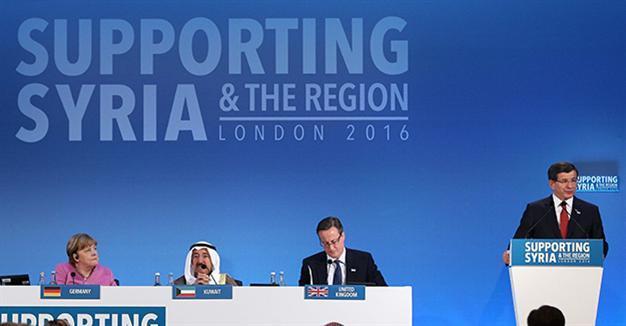Turkish PM warns of new wave of refugees from Syria
LONDON

UN Secretary-General Ban Ki-moon, Norweigan Prime Minister Erna Solberg, German Chancellor Angela Merkel, the Emir of Kuwait, Sheikh Sabah al-Ahmad al-Sabah, and British Prime Minister David Cameron listen as Turkish Prime Minister Ahmet Davutoğlu speaks during the 'Supporting Syria & The Region' donor conference at the QEII centre in central London on February 4, 2016. AFP Photo
Turkish Prime Minister Ahmet Davutoğlu has warned of a new wave of Syrian refugees totaling as many as 80,000 after people began to move toward Turkey due to increased airstrikes in the country’s northwest.
“Some 10,000 new refugees are waiting at Turkey’s border [with Syria] due to the airstrikes in Aleppo. Some 60,000 to 70,000 people, who are in camps north of Aleppo, are moving toward Turkey,” said Davutoğlu during a donor conference entitled “Supporting Syria and the region” at the QEII center in central London on Feb. 4.
“Right now, my heart is with my country’s border. I am thinking of how and where we will need to locate the people coming from Syria,” he added.
Turkey currently hosts 2.5 million Syrian refugees – the most of any country – and has made a deal with the EU to receive funds worth 3 billion euros to be used for the refugees in the country, in exchange for permitting fewer migrants to leave for the EU.
Davutoğlu said the country had so far spent $10 billion on Syrians who have been placed in refugee camps in the country. He said an estimated $20 billion more could be needed to care for those outside of the camps.
The U.N. and regional countries have said they need $9 billion in assistance for Syria in 2016 alone, which they wish to raise at the donor’s conference. Past aid conferences for Syria have failed to deliver – last year’s raised just half of its target.
Because the donations announced are for varying periods, it is difficult to calculate how much of the $9 billion has been pledged so far.
The U.K. announced that it would commit 1.2 billion pounds ($1.75 billion) in new aid to be delivered over the next four years. The pledge takes the total British contribution since 2011 to 2.3 billion pounds.
Germany has pledged 2.3 billion euros ($2.5 billion) in humanitarian aid for Syria through 2018, including 1.2 billion euros this year.
The United States has said it will contribute about $900 million, with around $600 million going to life-saving assistance such as food and shelter for Syrians. The rest will support education in Jordan and Lebanon, including for almost 300,000 Syrian refugees.
Norwegian Prime Minister Erna Solberg increased aid to Syria to $280 million in 2016, with a total of about $1.1 billion over the next four years.
Italy pledged $400 million over the next three years, while the Japanese Ministry of Foreign Affairs said it was committing $350 million in 2016.
The United Arab Emirates pledged $137 million in 2016.
Davutoğlu said there were around 700,000 children of school age and that only 300,000 of them could currently be educated.
“We want to provide the rest with education, too. More than 250,00 Syrians are in camps, while more than three times this number live in cities. There is no city in Turkey that does not contain Syrian refugees,” said Davutoğlu, adding that only 40 percent of Turkey’s southern province of Kilis were Turkish citizens, while the rest were Syrian migrants. “You can imagine the social and economic hardships that this creates in our country.”
